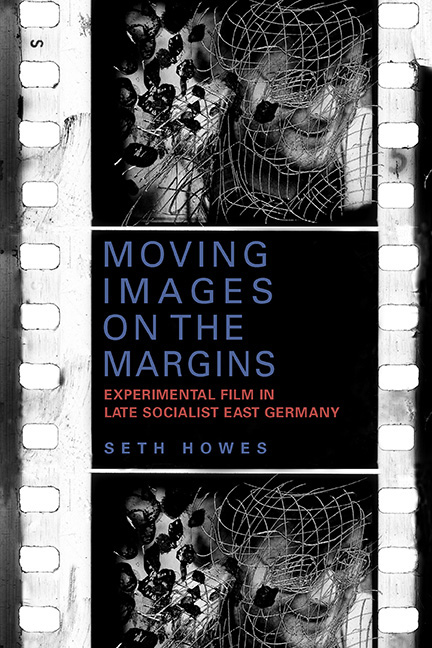Book contents
- Frontmatter
- Dedication
- Contents
- List of Illustrations
- Acknowledgments
- Introduction
- 1 Art, Experimentation, and the Avant-Garde in East Germany
- 2 Heraklesmaschine: Lutz Dammbeck's Experimental Cinema and the Expropriation of the Senses
- 3 Lines of Communication: Mail Art and the Connectivity of Experimental Film
- 4 Herz Horn Haut Schrein: Film and the Autoperforating Body of/at Work
- 5 Film Experiments, Design Anthropology, and the Politics of Vision: Yana Milev's Theory of Practice
- Conclusion: Images of Moving Margins
- Notes
- Bibliography
- Index
2 - Heraklesmaschine: Lutz Dammbeck's Experimental Cinema and the Expropriation of the Senses
Published online by Cambridge University Press: 21 March 2020
- Frontmatter
- Dedication
- Contents
- List of Illustrations
- Acknowledgments
- Introduction
- 1 Art, Experimentation, and the Avant-Garde in East Germany
- 2 Heraklesmaschine: Lutz Dammbeck's Experimental Cinema and the Expropriation of the Senses
- 3 Lines of Communication: Mail Art and the Connectivity of Experimental Film
- 4 Herz Horn Haut Schrein: Film and the Autoperforating Body of/at Work
- 5 Film Experiments, Design Anthropology, and the Politics of Vision: Yana Milev's Theory of Practice
- Conclusion: Images of Moving Margins
- Notes
- Bibliography
- Index
Summary
Der Film hat keine Geschichte, er hat ein Thema.
—Lutz DammbeckREALFilm: Live, in Three Dimensions
LEIPZIG, 1986: On the public address system of the Haus der Volkskunst, dissonant piano music competes for attention with swirling Ufa strings and brassy 1930s jazz. Family photographs from Christmas, 1944, the men in martial uniform, are projected onto a wall. Superimposed upon them is early-1950s newsreel footage, run at half-speed, of a May Day parade in the GDR. The artist and filmmaker Lutz Dammbeck, clad in the navy overalls of a technician or machinist, wraps the dancer Fine Kwiatkowski, a slight woman with a shaved head, clad in a sheer unitard, in tatters of butcher-paper that earlier, before they were torn, had formed a projection screen. We read jagged capital letters, painted a foot high on the back wall of the space: ‘In December 85 Leipzig the films of Andrei Tarkovsky were washed / blank film resulted.’ On the ceiling, projected instead of painted, is the typed text: ‘Mass reproduction responds to the reproduction of masses—W. Benjamin.’ At the event's end, Kwiatkowski huddles under a pyramidal structure made of willow saplings, and covered with a translucent membrane. Dammbeck raises a clear plastic sheet between the seated audience and the performance space, and obscures himself and Kwiatkowski with sweeping strokes of white paint, turning the transparent screen opaque.
This event had been advertised as Schattierungen No. 13: Musik- Bewegung-Projektion (Shadings No. 13: Musik, Movement, Projection), to be given by ‘the group REALfilm (with Fine Kwiatkowski, among others).’ This was not the first such action that Dammbeck and Kwiatkowski had collaborated on; in fact, it was one of eight events, dubbed ‘media collages’ by Dammbeck, that he and Kwiatkowski mounted between 1984 and 1986. Between instantiations of the project, Dammbeck added elements or removed them, continually changing the spatial and sequential arrangement of materials, and adapting each media collage's choreography to the available space. Later events repeated and modified choreographic elements developed in earlier ones; for example, video footage of Dammbeck and Kwiatkowski's first rehearsals for the project was transferred to 16mm film and projected back onto the dancer in later public events. She interacted with this projected image of herself, imitating or deviating from its movements. The evolution of these media collages, Dammbeck has written, represented ‘continuing work on one piece.’
- Type
- Chapter
- Information
- Moving Images on the MarginsExperimental Film in Late Socialist East Germany, pp. 36 - 73Publisher: Boydell & BrewerPrint publication year: 2019



